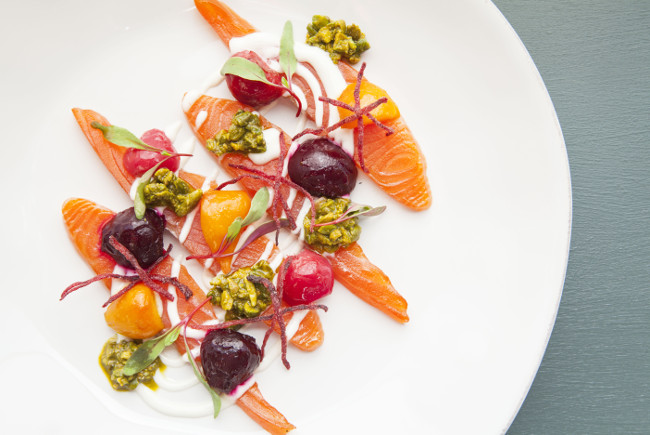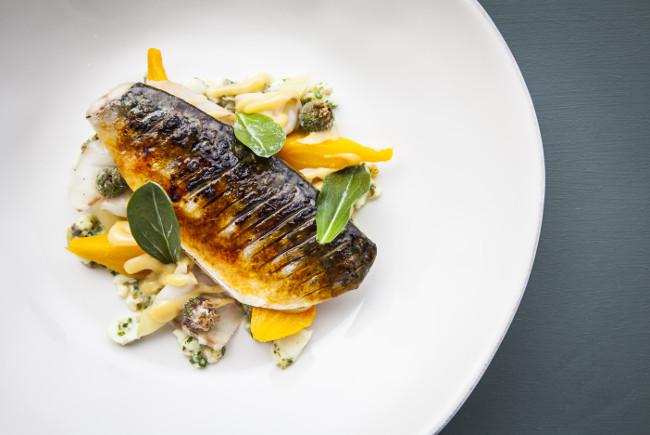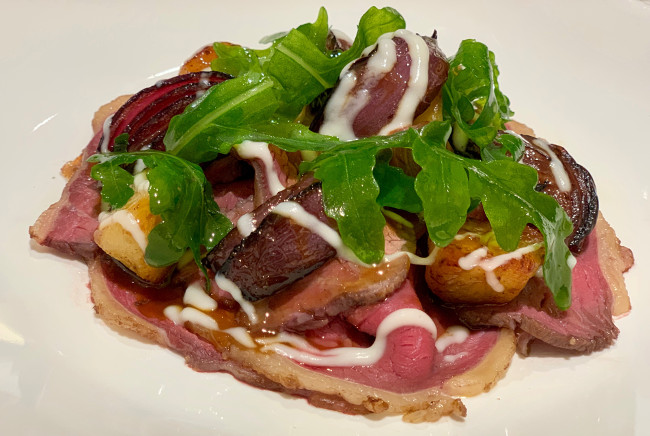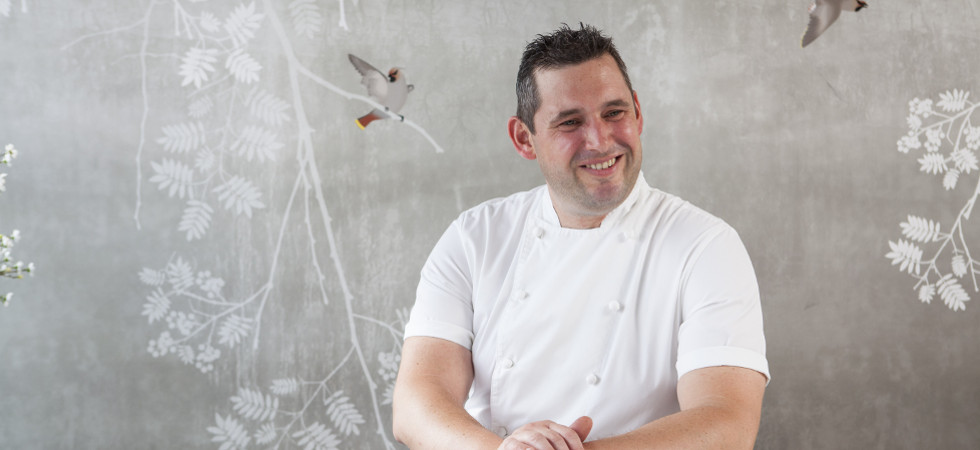With London’s ever-changing dining scene, staying relevant and in-demand can be quite a feat. Neighbourhood restaurant Kitchen W8—co-owned by Rebecca Mascarenhas and Phil Howard—has done more than that. Aside from being a Kensington favourite since it first opened in 2009, it has also held a Michelin star for the past 8 years. I paid a visit to the discrete dining spot tucked away on Abingdon Road and understood straight away how it has continued to delight both regulars and newcomers for nearly a decade.
We toasted the end of the beautiful London summer with a glass of Kitchen W8’s homemade shiso lemonade as an aperitif. It was extremely refreshing and it was very difficult to not order a few more. As a first timer to the restaurant, I was recommended the grilled Cornish mackerel with smoked eel, sweet mustard, and leek to start.
It was evident that Chef Mark Kempson, who has been at Kitchen W8 since its opening, is an expert at drawing out a myriad of flavours from his ingredients. The dish has layers of textures that kept me discovering new things with every bite. My lunch companion chose the cured sea trout with summer beets, horseradish and pistachio which looked like art on a plate with bursts of colours and flavours.

“I would describe my cooking as seasonal and flavour-driven,” says Kempson. “Having a busy restaurant is the key for us. I think consumers’ wants and needs have changed and I think the industry has changed and become more diverse overall. I think this has been reflected by the restaurants that are recognised [by the Michelin Guide]. I do not feel that the Michelin star has limited the cooking at Kitchen W8. Delicious, accurately-cooked food will always deliver and please your customers.”
For my main course, I chose the thinly-sliced beef rump with spiced aubergine, red onion, pink firs, garlic, and rosemary, paired with a 2013 Cabernet Franc-Merlot whilst my companion had the fillet of Cornish cod, charred octopus, coco beans, courgette, and gremolata paired with a 2018 Albariño from Rias Baixas in Spain.
It was not difficult to completely devour both dishes as each ingredient had a purpose and role to play in the finished plates. After falling in love with the shiso in the aperitif, we ended our meal with the delightful English blueberry cheesecake with shiso sorbet.
Chef Kempson joined us after our meal to talk about the restaurant’s 10th birthday and how his leadership style has evolved throughout the years.

You got your start in the industry from a very young age. What made you decide to turn your job at the pub into a full-on career in restaurants?
I was invited into the kitchen at a young age one weekend when a chef was sick. It got me! I was completely mesmerised by what was happening behind the scenes and I knew I wanted to pursue it.
Many people I’ve interviewed say that it’s a common misconception that jobs within the hospitality industry are poorly-paid. What are your thoughts on this?
I think hospitality can be very well paid. If you work hard, you get noticed and along come the rewards. I guess that is the same in any industry. Always go the extra mile.
You’ve worked with some of the leading chefs in the industry. What were some of the key lessons you learned from them?
Kitchen W8 has been a huge journey and a massive learning curve for me. I have come to learn that if you want to survive you must ensure the restaurant is firing on all cylinders: from finance, to back of house and front of house. You can only be as good as the team around you.
You’re celebrating Kitchen W8’s 10th anniversary. What are some of the biggest changes the restaurant has gone through since you first opened and what were some of the biggest challenges that you learned from?
Over the past ten years the restaurant has gone through many changes. Some of the more serious changes have been upgrading the kitchen, which was well-received by the team. Last summer we redesigned the dining space and installed a private dining room. We wanted to lighten the feel and atmosphere of the dining room, something I feel we have achieved. It has also helped to ensure we remain a relevant restaurant in the current London dining scene.

10 years is a long time, especially in London! It really is quite an accomplishment. How have you managed to stay successful for so long?
That’s a good question. I don’t know, I suppose it’s just organic growth and continuing to try to grow and improve ourselves and, ultimately, pleasing customers. Repeat business is important to us and we’re a neighbourhood restaurant; we make sure we look after everyone, especially our regulars, to make sure they come back. And if they do, to me, that’s a good sign that they like what you’re doing, they want to spend time in your restaurant and eat the food you’re producing and that inspires you to want to do more…as long are you’re busy, that keeps you going, keeps you moving and progressing.
What’s a commonly ignored ingredient that you love using in your cooking?
There is not an ingredient I can single out, but at the minute, I am loving lemon verbena and wish it was used more.
Do you make any dishes especially for tourists who want typical British food and anything particular for your regulars who have their own favourites as well?
We cook very seasonally, so I don’t design dishes for specific groups of customers. The menu is dictated by what’s in season at the time, using the best ingredients that’s available at the moment. So this time right now is interesting as you have the late summer ingredients and then you have the early Autumn ingredients too. What you find is you end up with a menu that is not quite in sync as it should be. If you leave it another month, it will read all Autumn. So that’s how we design the menus, it’s not really who am I cooking for, it’s about what’s around at the minute and how do we get the most out of that ingredient.

How do you teach your team to be resourceful with ingredients? There is a lot of talk around zero-waste cooking now, but many cultures have been practicing this for years.
I don’t think that’s a new thing. I think, as a chef, you were trained right from the early days to use everything. It’s your responsibility to make sure that you use everything. Think about how something started from a seed or egg and someone has nurtured it, looked after it, grown that ingredient, and then it has finally ended up with us, and we have a responsibility to make sure we look after it and give it the same respect it’s had for the rest of its time to deliver it to the customer.
Once people understand that, I think they have more respect for the ingredient. And it’s tough, because the kitchen is high-pressure. When you’re young it’s a bit nerve wracking and it doesn’t always come to the forefront of your mind, that kind of thing. If you make people stop and try to understand that, you become much more mindful about wastage. From a business point of view as well, if you buy a whole chicken and use the breast, well what are you going to do with the legs or the carcass after it’s roasted? Can you make a consommé? A stock? There are so many options.

I know you have a family, and being a chef can be an incredibly draining job. How do ensure that work-life balance for yourself and how do you look after the wellbeing of your team?
Well, being a chef is always going to be difficult. You’re always going to do more than an office job; that’s the nature of it. In the last five years, people have become more aware and conscious of it. It’s about making sure people don’t work ridiculous straights with no days off—obviously I don’t want to work like that. I have my family at home, so I want the team to have the same as I have.
I need to make sure I’m off regularly, make sure that everyone has breaks within the day without these huge long straights. We’ve reduced the hours too; starting later, cleaning down the fish and going home as quickly as possible after service. Some restaurants start to do prep after service. We don’t do any that. Of course it’s difficult, but you just need to make it happen…as a business you just need to be responsible about that and for the wellbeing of everyone, that’s just the way it has to be.
To celebrate the restaurant’s 10th anniversary, a special tasting menu featuring the most popular dishes over the past decade will be available from the 14th-27th of October. The seven-course tasting menu (£75pp or £120 with wine pairing) will include dishes such as thinly-sliced smoked eel with grilled Cornish mackerel, sweet mustard, and leek; smoked haunch of Fallow deer; and caramelised Orkney scallop.
Address: 11-13 Abingdon Rd, Kensington, London W8 6AH
Phone: 020 7937 0120
Website: kitchenw8.com






















